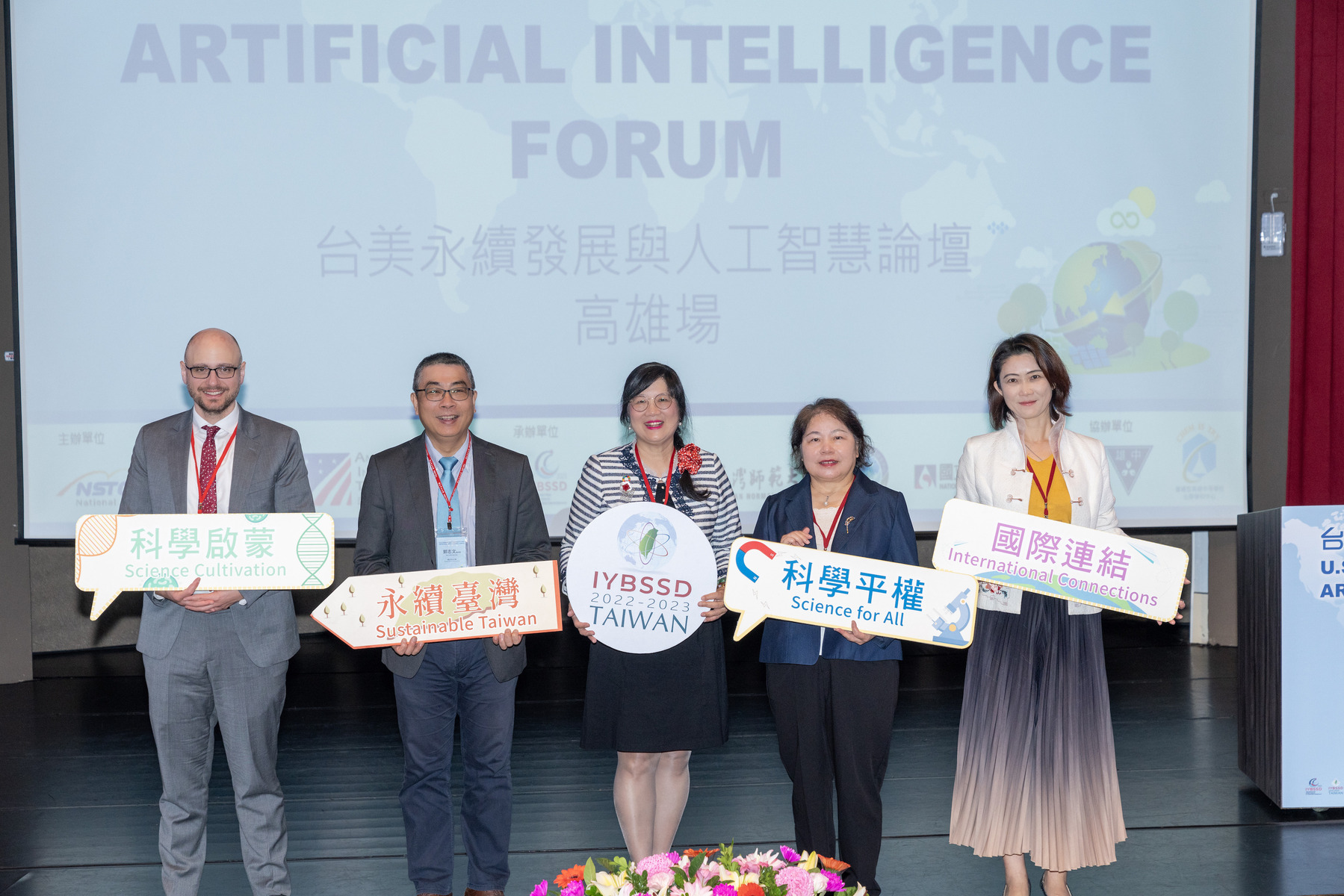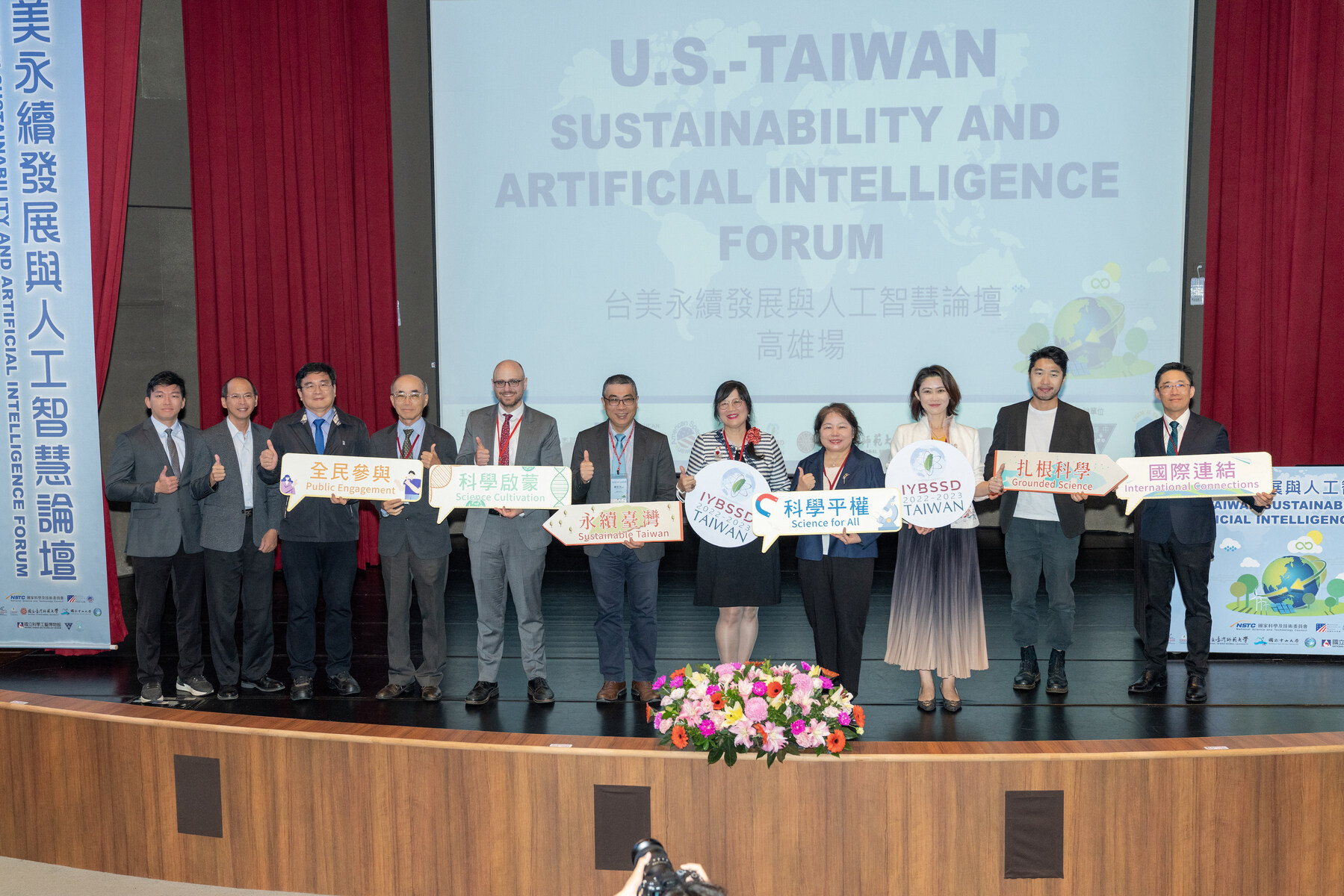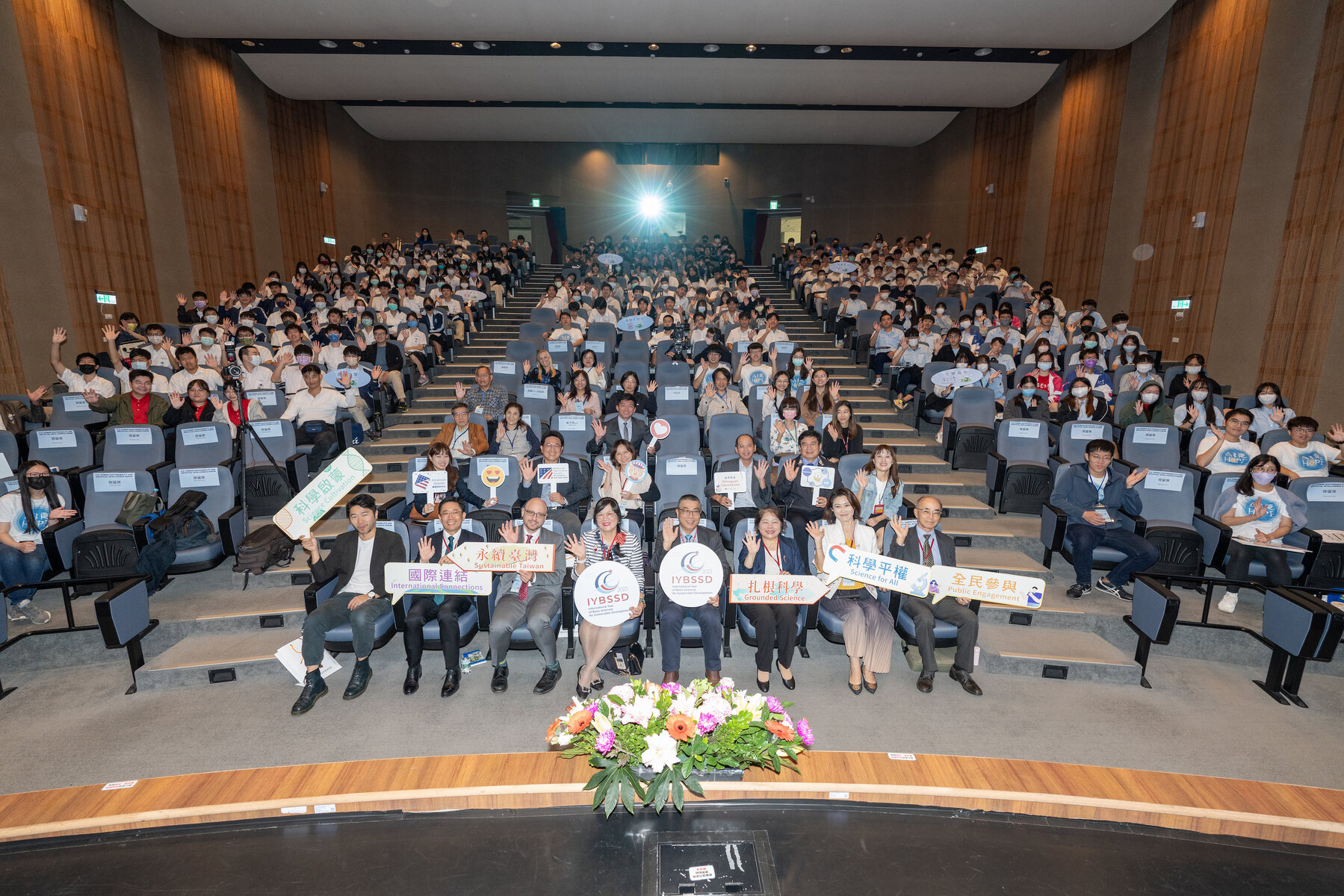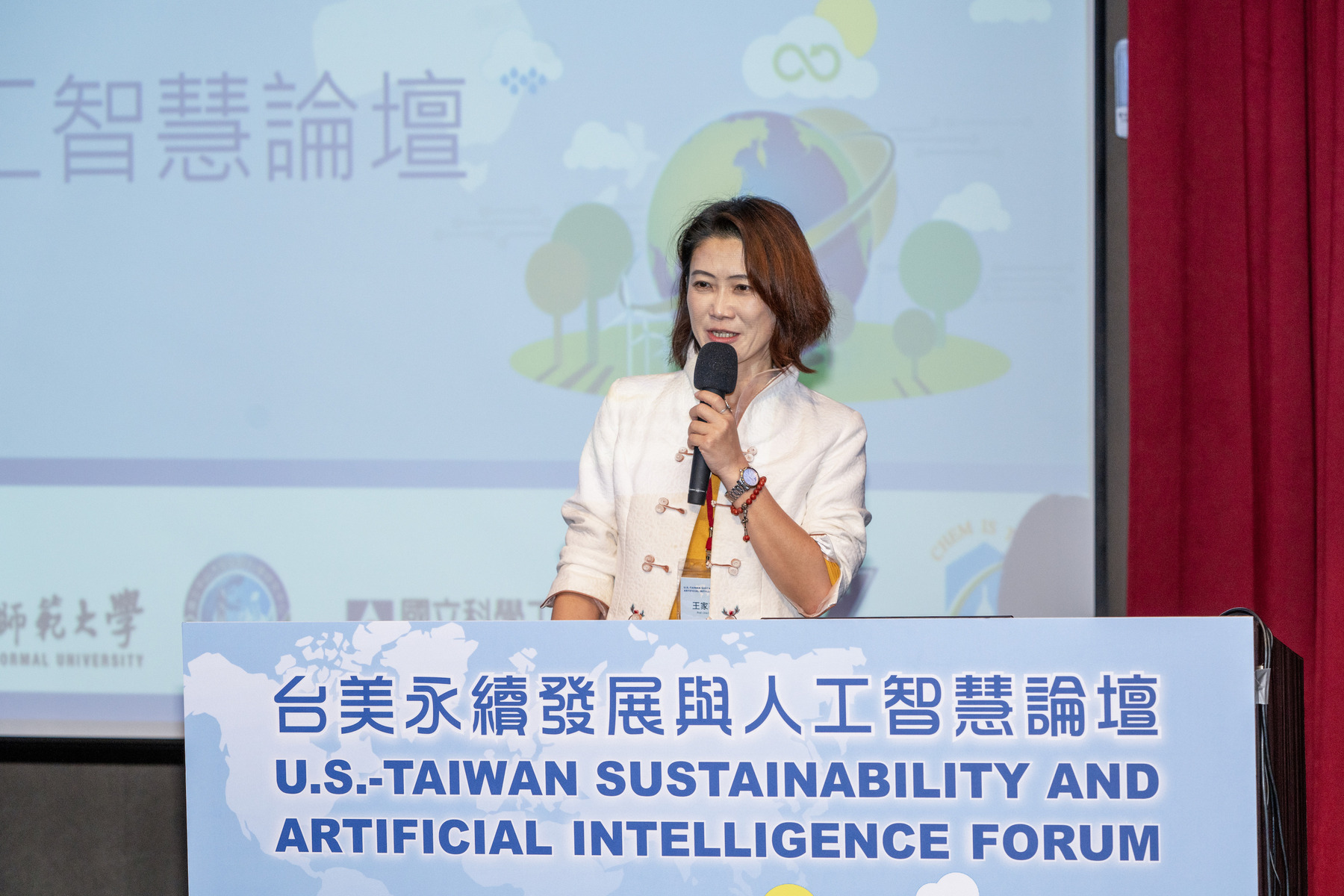The U.S.-Taiwan forum was held in response to the UN’s science sustainable development





2024-06-25
In response to the United Nations' International Year of Basic Science for Sustainable Development (IYBSSD), the National Science and Technology Council (NSTC) and the American Institute in Taiwan (AIT) held the "U.S.-Taiwan Sustainability and Artificial Intelligence Forum" at the National Science and Technology Museum (NSTM) in Kaohsiung. The Forum invited academic researchers, industry professionals, and young students from Taiwan and the U.S., including the Anthropogenic Climate Change Center at Academia Sinica and the Aerosol Science Research Center (ASRC) of National Sun Yat-Sen University (NSYSU), to discuss the two major topics of ecological sustainability and artificial intelligence, hoping to gather the wisdom of all walks of life and sustain the earth.
The forum was co-organized by the National Taiwan Normal University, NSYSU and NSTM and was chaired by Samuel Goffman, Deputy Branch Chief of the Kaohsiung Branch Office of the AIT, Chih-Wen Kuo, then Senior Vice President of NSYSU, and Hsiu-Feng Lee, Director General of the Kaohsiung NSTM, and the Principal investigator, Professor Emeritus Mei-Hung Chiu, kicked off the event with an opening speech.
Chih-Wen Kuo, then Senior Vice President of NSYSU, served as the moderator of the plenary talk focusing on the increasingly popular global issue of ecological sustainability. Dr. Huang-Hsiung Hsu, CEO of the Anthropogenic Climate Change Center of Academia Sinica, first shared in his speech the opportunities and challenges all humanity faces in the current climate crisis. Prof. Chia C. Wang, director of the ASRC of NSYSU, talked about the profound impact of aerosols on atmospheric chemistry and global climate, the sustainability of Earth's ecology, and the potential role and contribution of artificial intelligence in critical issues. Arthur Huang, founder and CEO of MINIWIZ, and Shao-Kang Lee, director of government affairs and communications of Corning Display Technologies Taiwan Co., also discussed the importance of zero waste and sustainable development to human and environmental sustainability.
Mu-Jeng Cheng, associate professor of the Department of Chemistry at National Cheng Kung University, served as the moderator of the plenary talk focusing on artificial intelligence. Yung-Jen Hsu, professor at the Department of Computer Science and Information Engineering of National Taiwan University; Pao-Ann Hsiung, professor of the Department of Computer Science and Information Engineering of National Chung Cheng University, director of Research Center on AI and Sustainability; Vincent Shih, Assistant General Counsel of Microsoft and General Manager of CELA at Microsoft Taiwan; and Ku-Jei King, director of Strategy, Infrastructure and Systems at DELL Taiwan, served as speakers. During the meeting, key topics were discussed, such as the application and impact of artificial intelligence technology in modern society and future trends and challenges.
This forum also held an exhibition of sustainable science popularization teaching aids, which showcased the popular science explainer comics "The Quest of the Virosols" on the virus-laden aerosol dissemination and the "Air Don't Cry-Fight for Clean Air" decision-making board games initially developed by the ASRC of NSYSU, as well as puzzle board games with the theme of sustainable development produced by groups such as Playful Intelligence Social Enterprise. More than 200 students from six high schools, including Kaohsiung Municipal Kaohsiung Senior High School, Kaohsiung Girls' Senior High School, Tsoying Senior High School, National Pingtung Senior High School, National FengHsin Senior High School, and the Affiliated Senior High School of National Kaohsiung Normal University, as well as the general public, participated in this forum through on-site entities or online live broadcasts. It provides an opportunity for in-depth academic exchanges and a platform to promote cross-domain cooperation and multi-directional interaction. Through the rich experience, opinions, and innovative thinking of academic experts and industry professionals, the horizons of young students are expanded, and they are inspired to view and understand science with a correct attitude and implement sustainable goals in action.
In response to the United Nations' International Year of Basic Science for Sustainable Development (IYBSSD), the National Science and Technology Council (NSTC) and the American Institute in Taiwan (AIT) held the "U.S.-Taiwan Sustainability and Artificial Intelligence Forum" at the National Science and Technology Museum (NSTM) in Kaohsiung. The Forum invited academic researchers, industry professionals, and young students from Taiwan and the U.S., including the Anthropogenic Climate Change Center at Academia Sinica and the Aerosol Science Research Center (ASRC) of National Sun Yat-Sen University (NSYSU), to discuss the two major topics of ecological sustainability and artificial intelligence, hoping to gather the wisdom of all walks of life and sustain the earth.
The forum was co-organized by the National Taiwan Normal University, NSYSU and NSTM and was chaired by Samuel Goffman, Deputy Branch Chief of the Kaohsiung Branch Office of the AIT, Chih-Wen Kuo, then Senior Vice President of NSYSU, and Hsiu-Feng Lee, Director General of the Kaohsiung NSTM, and the Principal investigator, Professor Emeritus Mei-Hung Chiu, kicked off the event with an opening speech.
Chih-Wen Kuo, then Senior Vice President of NSYSU, served as the moderator of the plenary talk focusing on the increasingly popular global issue of ecological sustainability. Dr. Huang-Hsiung Hsu, CEO of the Anthropogenic Climate Change Center of Academia Sinica, first shared in his speech the opportunities and challenges all humanity faces in the current climate crisis. Prof. Chia C. Wang, director of the ASRC of NSYSU, talked about the profound impact of aerosols on atmospheric chemistry and global climate, the sustainability of Earth's ecology, and the potential role and contribution of artificial intelligence in critical issues. Arthur Huang, founder and CEO of MINIWIZ, and Shao-Kang Lee, director of government affairs and communications of Corning Display Technologies Taiwan Co., also discussed the importance of zero waste and sustainable development to human and environmental sustainability.
Mu-Jeng Cheng, associate professor of the Department of Chemistry at National Cheng Kung University, served as the moderator of the plenary talk focusing on artificial intelligence. Yung-Jen Hsu, professor at the Department of Computer Science and Information Engineering of National Taiwan University; Pao-Ann Hsiung, professor of the Department of Computer Science and Information Engineering of National Chung Cheng University, director of Research Center on AI and Sustainability; Vincent Shih, Assistant General Counsel of Microsoft and General Manager of CELA at Microsoft Taiwan; and Ku-Jei King, director of Strategy, Infrastructure and Systems at DELL Taiwan, served as speakers. During the meeting, key topics were discussed, such as the application and impact of artificial intelligence technology in modern society and future trends and challenges.
This forum also held an exhibition of sustainable science popularization teaching aids, which showcased the popular science explainer comics "The Quest of the Virosols" on the virus-laden aerosol dissemination and the "Air Don't Cry-Fight for Clean Air" decision-making board games initially developed by the ASRC of NSYSU, as well as puzzle board games with the theme of sustainable development produced by groups such as Playful Intelligence Social Enterprise. More than 200 students from six high schools, including Kaohsiung Municipal Kaohsiung Senior High School, Kaohsiung Girls' Senior High School, Tsoying Senior High School, National Pingtung Senior High School, National FengHsin Senior High School, and the Affiliated Senior High School of National Kaohsiung Normal University, as well as the general public, participated in this forum through on-site entities or online live broadcasts. It provides an opportunity for in-depth academic exchanges and a platform to promote cross-domain cooperation and multi-directional interaction. Through the rich experience, opinions, and innovative thinking of academic experts and industry professionals, the horizons of young students are expanded, and they are inspired to view and understand science with a correct attitude and implement sustainable goals in action.
Click Num:
Share
